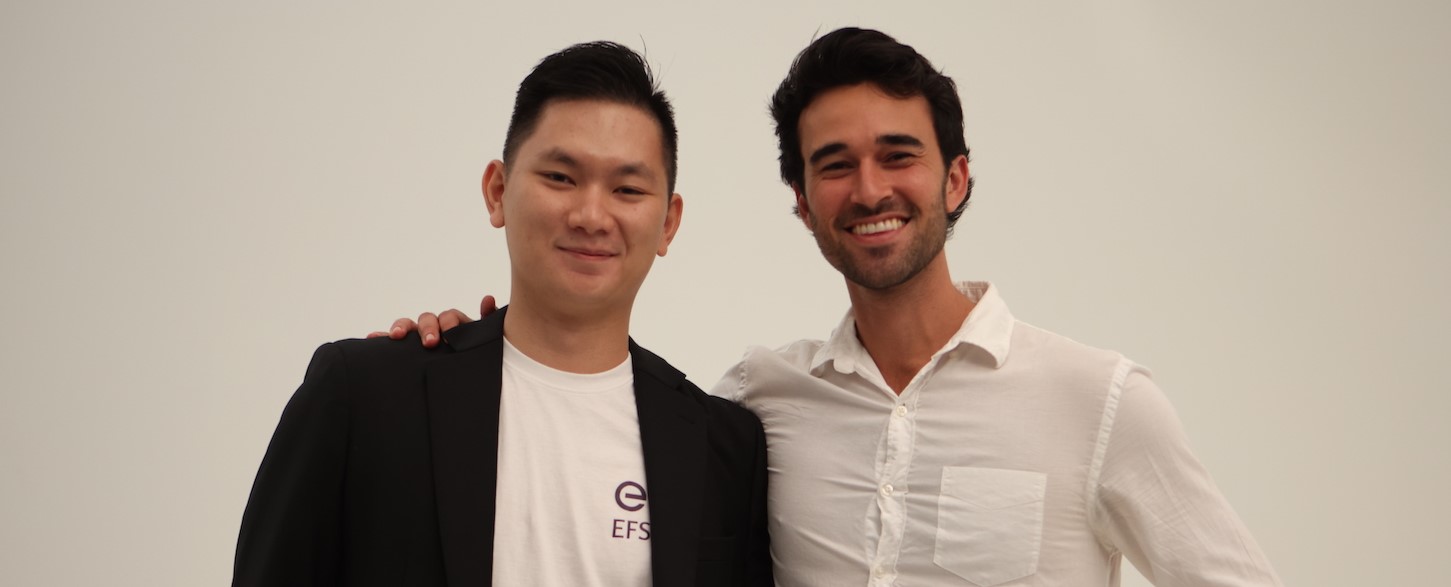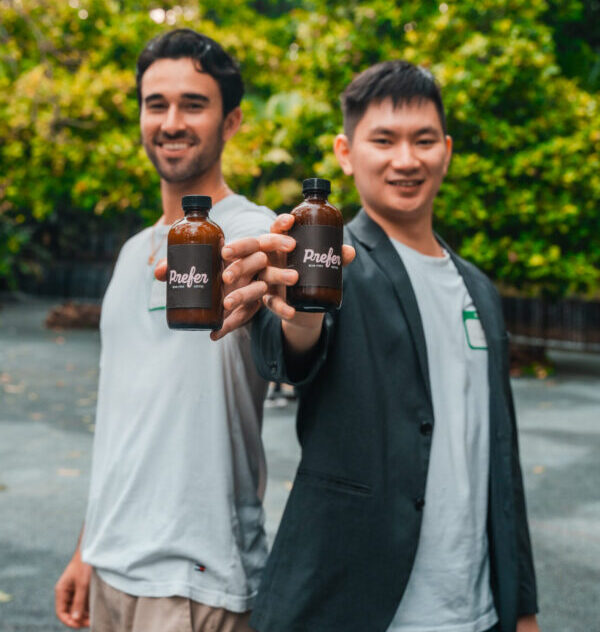Prefer’s Unique Coffee-Making Process
Q: Can you share some background on Prefer?
A: We’re doing something a bit unconventional with coffee. Traditional coffee relies on coffee beans, but we’ve noticed the supply is getting scarcer while demand is rising. This is making coffee pretty pricey. So we’re shaking things up by making coffee without coffee beans.
We’re taking things like bread, soy, and brewers’ spent grain—stuff that usually gets tossed—and fermenting them. This process creates coffee flavors, and then we go on to roast and grind this material. What we get at the end is ground coffee that can be used in espresso machines and (almost) all the other ways people love to make coffee. We sell coffee grounds to businesses in the coffee space who are looking for a more sustainable and cost-effective coffee supply.
We’re set up in Singapore at a facility called Narasa, which is part of Temasek. We’re aiming to change the coffee game by being more eco-friendly and cost-effective.
Q: How did the idea for Prefer come about?
A: The spark for Prefer came when I stumbled on a study showing that coffee has a higher carbon footprint than you’d think—even more CO2 than the equivalent weight of things like chicken, fish, and milk. That was an eye-opener! I started digging deeper and found out that climate change is gonna make 50% of current coffee-growing land unusable by 2050. Add to that, demand for coffee is expected to triple in the same time frame.
So here we are, staring at a $500 billion market that’s ripe for disruption, especially from a sustainability angle. There are so few alternatives out there, and that’s what got my gears turning. It felt like the perfect match for what I wanted to tackle.
Why Entrepreneur First
Q: What made you apply to Entrepreneur First?
A: I was coming from venture capital, specifically in food tech. I had the awesome opportunity to chat with some of the most brilliant and interesting founders in the industry. Those conversations gave me a good look at the gaps in the market and sparked a few ideas in my head. I knew I wanted to jump into this high-impact space, particularly one focused on climate issues.
The only problem was that I didn’t have the technical know-how in food tech—I’m trained as a neuroscientist, not a food scientist. That’s where Entrepreneur First came in. It offered the perfect platform for me to meet like-minded people who had the technical skills to bring these food tech solutions to life. It was a no-brainer for me to apply and leverage that network to build something impactful.
The Application Process for Entrepreneur First
Q: Can you describe the application process for Entrepreneur First?
A: The application process was pretty streamlined. I started with a 30-minute get-to-know-you call after a warm intro to someone at Entrepreneur First. After that, there was a 15-minute technical call where they dug into my skills, past roles, and what kind of tech experience I had. It got into the weeds a bit—like if I managed a CRM, which one and how I used it, or if I coded something, what language I used.
The final 15-minute call was behavioral, asking questions like, “Have you ever led a team based on your idea?” or “Do you ever feel like an outsider?” They’re looking for specific traits they’ve recognized in successful founders. After those three calls, I was in. They let me know within a week, and I joined their Slack group. The program started about a month after that.
Q: Do you have any tips for founders interested in applying to Entrepreneur First?
A: If you’re keen on applying to Entrepreneur First, there’s this must-read book by Alice and Matt called ‘How to Be a Founder.’ This book is packed with valuable nuggets about what EF is specifically looking for in its founders. The key takeaway is to show off your deep knowledge in a specific niche. They’re not after generalists; they want people who have a unique edge in a particular area—people who know stuff that others in the industry might not. So if you’ve got that kind of specialized insight, make sure it shines through in your application.
Early Steps in the Entrepreneur’s First Journey
Q: What’s the first thing that happens after you get accepted into Entrepreneur First?
A: Once you’re in, the ball’s in your court. You get added to the Slack channel where you can browse through profiles of other folks in your batch—usually around 50 people, half technical, half not. For me, I was a non-technical founder keen on food tech, so I scoured through profiles to find someone with the technical skills I lacked.
I ended up connecting with my co-founder, Ding Jie Tan, who’s an expert in fermentation and flavor creation. We hit it off on Slack and decided to meet up even before the program officially kicked off. By the time many were still on the hunt for the right co-founder, DJ and I had already teamed up. We were the second team in our batch to form, mainly because we had a lot in common and our interests aligned well.
When it comes to funding, we got pre-seed funding from them—75K SGD to be exact. It’s a nice financial cushion that allows us to focus more on developing our product and less on immediate fundraising.
Q: Did Entrepreneur First provide you with mentors and training sessions?
A: Oh, for sure! One of the perks at EF is that you get an ‘Entrepreneur in Residence.’ These are folks who’ve built their own companies and are now at EF to guide new founders. In my case, I had this awesome guy named Didier. We had weekly catch-ups to go over how things were progressing.
On top of that, you also get a venture partner, though meetings with them are a bit less frequent. They come more from an investor’s angle and help you refine your pitch deck and overall narrative. The support network at EF is pretty solid.
Q: Did you have an ‘aha moment’ during the program where you felt especially inspired or surprised?
A: It was all about rethinking how startups come to life. The common myth is that you’re chilling in bed and then the inspiration strikes. But that’s not it. It’s really about connecting with people in an industry you’re pumped about. You’ve got to dig deep, ask open-ended questions, and get to the core of what problems they’re facing.
Once you keep hearing the same pain points again and again, that’s when you know you’re onto something. For us, it was hearing from folks in the coffee industry about dwindling supplies, fluctuating quality, and rising prices. That got us thinking about how we could offer a stable, more affordable coffee solution. So, the aha moment wasn’t a bolt-from-the-blue kind of thing; it was more about understanding that great startups usually start by solving real-world problems.
The Current State and Future Plans of Prefer
Q: What’s the status of the company today?
A: Big things are happening! We’re on the cusp of closing our seed round. Won’t spill too many beans, but we’re happy with the capital we’ve raised since our time at EF. Right now, our eyes are set on going to market in a few months. We’ve been knee-deep in R&D and fundraising; now it’s time to focus on sales and product development.
Regarding market expansion, Asia is our playground for the next 18 months. We’ve already got customers lined up in Singapore and the Philippines, and we’re eyeing expansion into Indo, Korea, and Thailand. Only around 2025 do we plan to bring our operations to coffee-loving regions in Europe and the U.S.
We’re also planning to grow our team. Currently, we’re a lean squad of three. But, we’re planning to grow the team to 5 by the end of the year and 10 in 2024.
Q: Have you explored any growth channels?
A: All our current customers came in through warm introductions. A little LinkedIn magic here and there, and we’ve got more demand than we can meet for the next half a year. So, tapping into other growth channels hasn’t been our focus just yet. We’re all ears for the future, but for now, demand is already beating our door down!
Q: Do you still receive support from EF?
A: EF is like that cool cousin who introduces you to your new favorite band and then steps back to let you enjoy the music. I recently visited their HQ in London, and they’re good folks. But I’ve got my expectations in check. They introduced me to DJ, my co-founder, and that’s golden. Beyond that, they’ve never promised to be your typical, hands-on investors. So, I don’t expect the moon from them, but they’re always there.
Final Tips for Aspiring EF Founders
Q: Any last nuggets of wisdom for founders who are considering applying to EF?
A: Here’s the lowdown—focus on two things: having a blast and learning like there’s no tomorrow. If you get those two right, good things will naturally follow. Realize you can’t micromanage the universe. Some stuff is just outta your control. So don’t stress, just aim to have a good time while you’re at it.


